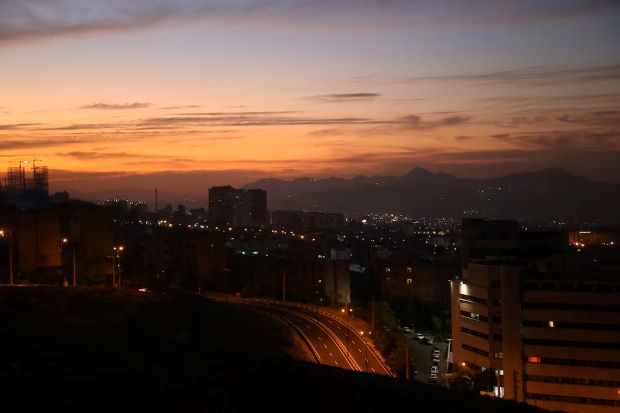Iran shrugs off Israel strikes, showing restraint say analysts
By Ahmad Parhizi and Menna Zaki
TEHRAN – After Israel’s deadly strikes, Iran lauded its defences while media outlets dismissed the assault as “weak”, signalling what analysts say is the Islamic republic’s reluctance to escalate further.
Saturday’s (26) Israeli attack on military sites followed an October 1 missile barrage by Iran — its response to the killing of militant leaders it backs and a Revolutionary Guards commander.
Iran said the strikes around Tehran and in the provinces of Khuzestan and Ilam killed at least four soldiers and caused “limited damage” to radar systems.
Officials and the media have largely downplayed the strikes, highlighting Iran’s air defences without promising a direct response.
“At least for now, Iran may be reluctant to respond directly and escalate tensions,” said political analyst Hamidreza Azizi in a post on X.
Iran’s supreme leader Ayatollah Ali Khamenei called the Israeli strikes “evil” and a “miscalculation” that “should neither be exaggerated nor minimized”.
“It is up to officials to determine how best to demonstrate the strength and resolve of the Iranian nation (to Israel),” he said.
President Masoud Pezeshkian praised the fallen soldiers for their commitment to “defend their land without fear”, while Foreign Minister Abbas Araghchi commended Iranians’ “determination to defend” themselves.
Iran’s military has so far refrained from public comment.
“Senior Iranian officials simply do not want to increase tensions,” said Fayyaz Zahed, international relations professor at the University of Tehran.
Ahead of Saturday’s strikes, Iran warned any attack on its “infrastructure” would provoke a “stronger response”, with Revolutionary Guards general Rassul Sanairad warning any attacks on nuclear or energy sites would cross a red line.
Iranian media highlighted comments from United Nations nuclear chief Rafael Grossi, who said atomic sites were untouched. They also noted key oil refineries in targeted provinces were unharmed.
Iran intensified diplomatic efforts before the attack, with Araghchi visiting regional countries to push ways to contain the conflict.
“Araghchi conveyed Iran’s serious will to Arab governments… that Iran would attack Israel with more missiles (if Israel attacked its infrastructure),” said Zahed.
Azizi said, “It remains to be seen whether this round of conflict is now over or if Israel will continue with direct or indirect military actions in the coming days and weeks.”
The tit-for-tat moves unfold amid Israel’s ongoing war with Hamas, which has expanded in recent weeks to include Lebanon’s Hezbollah.
Both groups are part of the “axis of resistance” aligned with Iran against Israel.
Israel’s military said it struck missile factories and military facilities across several provinces and cautioned Iran against retaliation.
Iran confirmed the strikes but said loud blasts in Tehran were its own defences intercepting missiles.
Michael Horowitz, expert at the Middle East-based security consultancy Le Beck, said Israel’s attack showed it was “not escalating to the highest level”.
“But it still might if Iran responds,” he told AFP.
On Sunday (27), ultraconservative Iranian daily Javan dismissed Israel’s attack as “weak”, saying it did not “even wake up” Iranians.
“The United States and Israel did not dare to give a firm response to Iran, and we consider this a victory,” it said.
Meanwhile, the hardline Kayhan newspaper criticized calls to “avoid a severe response”.
In contrast, reformist media supporting Pezeshkian’s government advocated for diplomacy to ease regional tensions, while the main reformist coalition urged authorities to “reduce tensions and prevent an all-out regional war”.
Saturday’s Israeli strikes drew condemnation from neighbouring Arab countries, including Saudi Arabia and the United Arab Emirates.
Azizi described the Arab response as “significant”, underscoring their “wish to avoid being drawn into this conflict”.
The reformist Etemad newspaper supported “Iran’s right” to respond but stressed its “responsibility to its neighbours who want to avoid war.”
Horowitz said Tehran now holds some “leeway to de-escalate”.
But, he warned, “the Pandora’s box has been opened, and the bar has now been set for any future escalation between Israel and Iran”.
-AFP



Comments are closed, but trackbacks and pingbacks are open.